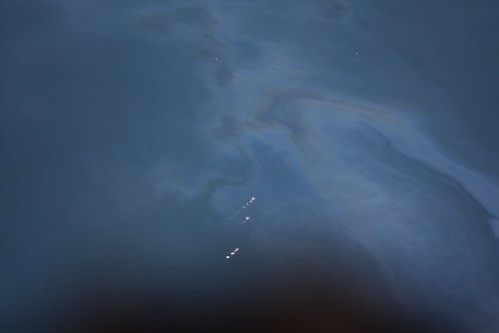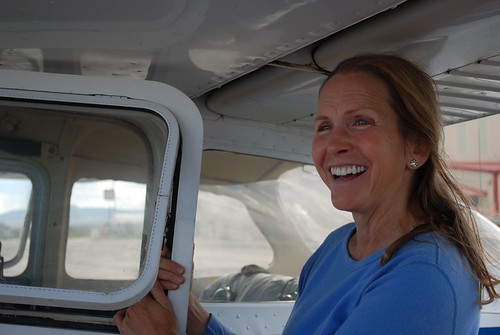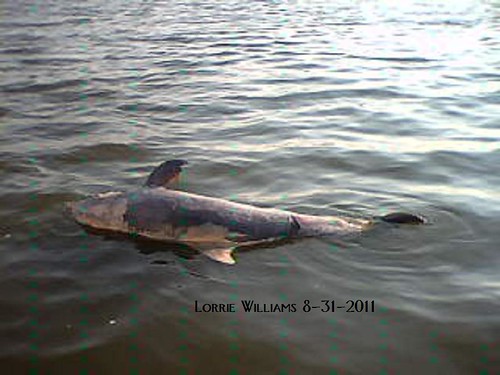A Storm of Anxiety About Fresh Oil Batters the Gulf
In the Gulf, another maelstrom has hit. But the tropical storm Mother Nature has brewed is not the top concern on some resident’s minds. They're more worried about the threat of fresh oil sighted near BP’s Macondo well 40 miles offshore.
The fact there is oil and sheen in the water now is irrefutable. After weeks of denial the Coast Guard has finally admitted it's there. But where it’s coming from and how much is bubbling up from the seabed is still very much in question. BP and the Coast Guard say there is no indication the oil sheen spotted recently—linked by some scientists to BP--is coming from a leak in the Deepwater Horizon well. But some speculate it could be coming from a crack in the seabed created by the explosion and three-month blowout that poured 170 million gallons of crude into the Gulf last year.
Bonny Schumaker, a former NASA scientist and founder of On Wings of Care, flew numerous times over the waters near the Deepwater Horizon well last month and captured what appears to be slicks of oil and sheen stretching for miles. Schumaker says she immediately reported her findings and coordinates to the Coast Guard and to research vessels in the area. The Coast Guard initially told her they sent out aircraft and boats to find the slicks but couldn't find them.
That, she says, is baffling. “How can a girl in a little airplane can go out and find oil with her own eyes day after day and the Coast Guard can’t find it?” She estimates her most recent sighting of oil this week found an oil sheen ten miles long and four miles wide, about 15 miles from the Macondo well. See her video from a flight on August 30th. Here's how she described it on her website:
In fact, we found so much oil out in the Macondo Prospect (near the site of the April 2010 explosion), that we have an 11-minute video of it that never covers the same area twice! Not since last summer have we seen this kind of expansive surface sheen. Metallic-gray and rainbow swirls stretched for miles, mixed with dark-brown stuff that resembled weathered crude more than sargassum weed. And there were those round-shaped 'globs' of oil again, here, there, and everywhere it seemed. We did not want to see this stuff anymore!

Bonny Schumaker found oil slicks in Gulf this week Photos: Bonny Schumaker
But what’s happening 40 miles out in the Gulf is not the only concern to those who make a living off the sea. Many are deeply worried about BP’s oily impact on the fisheries close to shore. At the top of the list are the Louisiana shrimpers who troll the shallow waters, fishing grounds that before the BP blowout were some of the most fertile in the world.
That’s hard to say now. The all important white shrimp season opened a week ago and some fishermen say it too will be a disaster, perhaps worse than the brown shrimp season that ended in July and was a disappointment to many.
“It’s the worst I’ve ever seen by a long shot,” says Grand Isle’s Dean Blanchard, once the largest shrimp buyer on the coast. “The white shrimp are born right hear near the coast. They can’t make it through this oil. These are born to die conditions.”
Blanchard says fishermen continue to report dead dolphins in the area on a daily basis, something he says was unheard of in previous years. And on Thursday he took a trip to some oyster beds in nearby Barataria Bay that had been seeded with oyster spat to try to encourage them to come back to life. Instead they found death and devastation. “Everything was dead and the cages were full of oil. No one down here is being held accountable.”
Grand Isle Mayor David Carmadelle was on the same trip with Blanchard and an LSU scientist and confirmed the discovery. The discovery shocked the mayor. Carmadelle says Grand Isle’s beaches are clean, something disputed by some residents. A nearby beach at Port Fourchon remains closed due to the oil. But the mayor agrees something’s not right with the fisheries.
“The fishermen complain there’s no shrimp," he says. "They know something is wrong because they can’t catch anything.”
Dead dolphin found off Mississippi coast this week Photo: Lorrie Williams
Many fishermen are getting desperate. Below is an email I received yesterday from Kindra Arnesen, who’s fishing family in the Buras/Venice area of Plaquemines Parish at the tip of the bayou has been severely impacted by the ongoing oil disaster.
There is oil in the Gulf of Mexico "Fresh OIL" we need help. The DWH incident crippled our fishermen & our fisheries, I have seen things I never saw before here off of South Plaquemines Parish. As this fresh oil spreads we wonder why is there nothing being done about it. If any of you can PLEASE HELP, save what’s left of the Northern Gulf.
Dean Blanchard says he has given up on getting help from BP or the government. He says his business lost at least $6 million due to impacts of the BP blowout, yet BP has paid him just $1 million so far. He’s had to lay off more than half of his employees and now is wondering if he just may have to shut down altogether.
“BP has turned by life upside down, and I don’t know what’s coming next. I may have to close down and go into the oil business because that seems to be the only thing left.”
Blanchard says he hopes a storm will stir everything up and blow it onto land. That’s about the only things he says can protect his faltering business—and the fisheries he depends on in the Gulf.
Everytime I talk to people like Dean I hope the news is better than before. But usually it isn't. A year ago, I blogged about a group of fishermen who joined victims of Hurricane Katrina and marched through the streets of the 9th Ward. They included Florida commercial fisherman Kathy Birren, who marched with her daughter holding a bright yellow hand-painted sign that said, “On the 5th day God created fish. In 2010 BP took them away.” This is what she told me a year ago:
"We’ve came here from Florida to help spread awareness that the oil disaster is continuing to cause damage to families all along the Gulf coast. They can’t just sweep this under the rug. The government has to stop lying.”
Today, it’s hard to imagine that these fishermen are in even worse shape. It will take years before science gives us answers about the environmental impacts and lawyers come to terms with the economic toll from this historical oil disaster. And when that time comes, what will Gulf fishermen like Dean Blanchard and Kindra Arnesen be doing?


